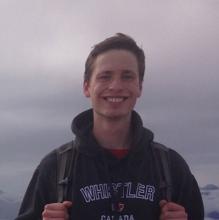Sam Anderson
Why did you decide to pursue a graduate degree?
I decided to pursue graduate studies because I have questions that I’m curious about that I wouldn’t be able to answer anywhere else! Going to grad school gave me the opportunity to start addressing new ideas and problems that weren't explored in my undergrad.
Why did you decide to study at UBC?
I came to UBC to work with my supervisor, Dr. Valentina Radic. I was drawn to work in an environment that encouraged interdisciplinary research and where people are interested in asking big questions. Dr. Radic's experience and curiosity have encouraged me to pursue interdisciplinary research around ice, water, and people.
What is it specifically, that your program offers, that attracted you?
I was changing disciplines when I came to grad school and so I didn’t want to dive directly into a PhD in case it turned out to be a bad fit. For me, it was great that here I had the option to start in the MSc program and then transfer directly into the PhD program once I got a foundation and knew for sure that this was the field for me.
What was the best surprise about UBC or life in Vancouver?
The weather here is ridiculous. I grew up in the Prairies, so Vancouver is like a tropical paradise. I love the cherry blossoms, too — and it turns out that I enjoy the rain!
What aspect of your graduate program do you enjoy the most or are looking forward to with the greatest curiosity?
I really enjoy that I’m surrounded by a pretty amazing group of people in geophysics — they’re a fearless and inspiring bunch. It makes for a great working environment.
What do you see as your biggest challenge(s) in your future career?
It can be mentally exhausting to spend so much time thinking about the seemingly existential problems related to climate change. So how does a person work in this field long term without losing hope? How do we push through and solve problems that exist on such a massive scale? I think that dealing with those sorts of questions will be a huge challenge in my career.
What aspects of your life or career before now have best prepared you for your UBC graduate program?
I did my undergrad in Engineering Physics at the University of Alberta. Even though these days I might not use all of the actual material that I learned in my undergrad, the skills that I gained — like how to work hard, how to approach new problems, and how to cope with stress — are highly useful.
What do you like to do for fun or relaxation?
Vancouver is a great place to enjoy the outdoors — I love playing volleyball, hiking, running, camping, and hanging out at the beach. Vancouver also has a lot of awesome beer and coffee spots, if it’s too rainy to be outside.
What advice do you have for new graduate students?
Don't be afraid to say “I don’t know”. Knowing where your knowledge ends is a key part of figuring out how to ask new questions. Also, it’s important to be honest with both yourself and with your supervisor about your interests and goals so that you can find ways to create an environment that’s conducive to achieving those goals. Schedule time to do things other than work — stepping back from research is actually a great way to think more creatively.

